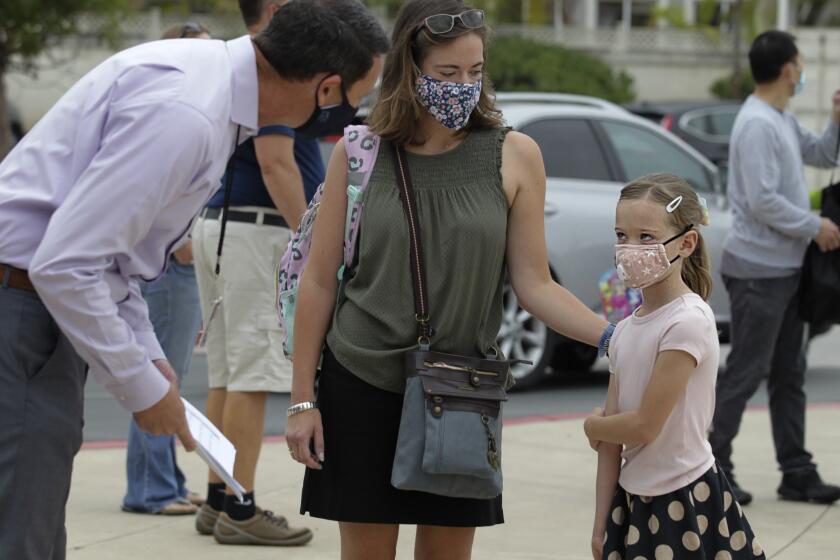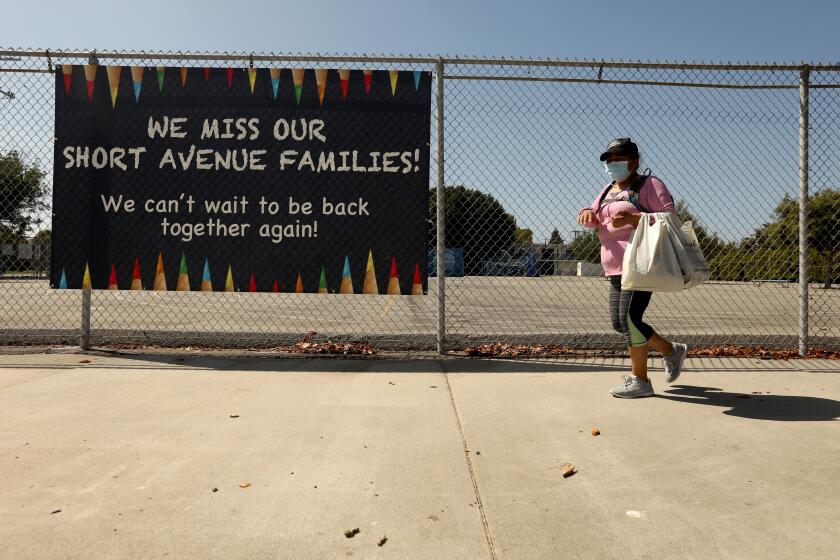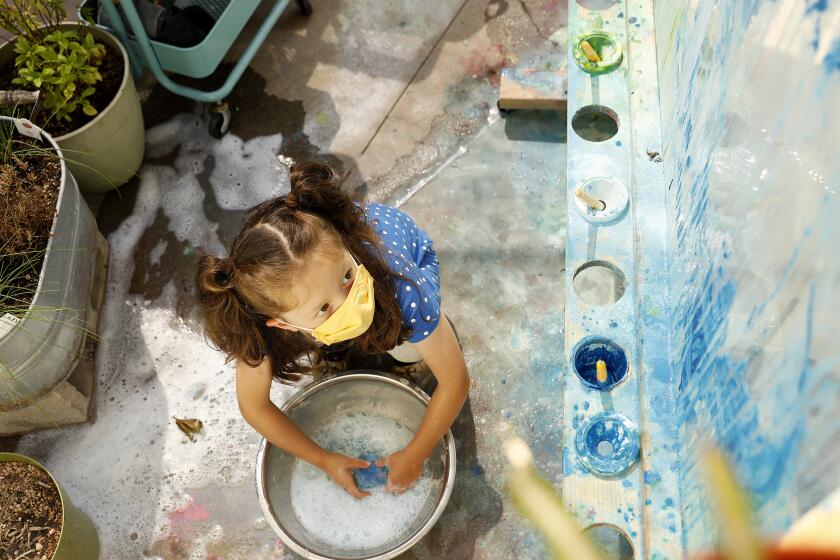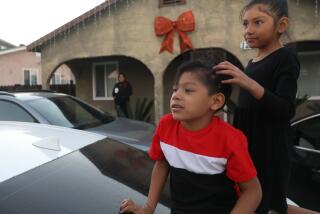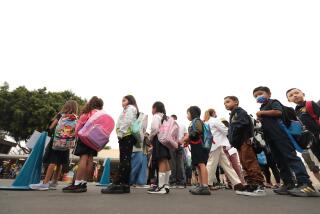L.A. schools are closed — but there are loopholes for those with money
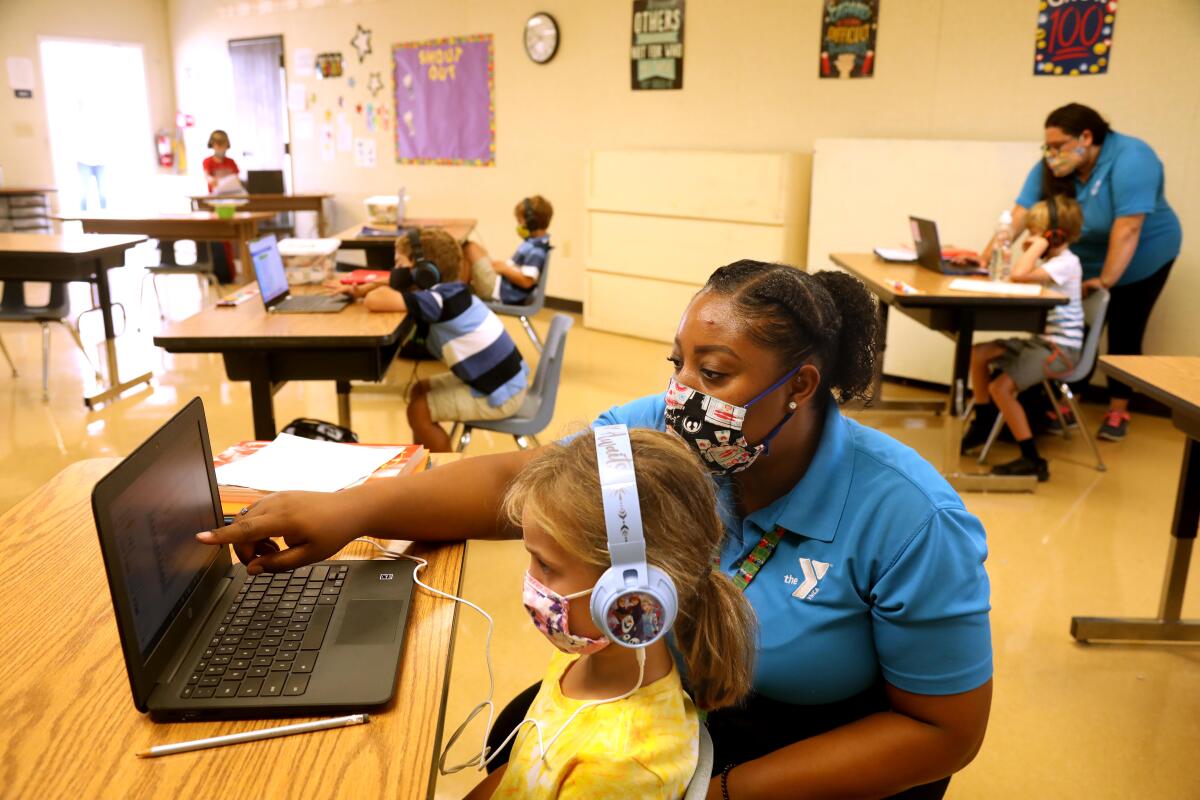
Lucio Haldeman, 9, squirmed in his chair, his eyes darting from the math program on his Chromebook to the schedule at the front of Ms. Esquibel’s fourth-grade classroom. Nearby, Alex Tanzillo slipped a snack from his lunchbox. It was their third week at Anza Elementary School in Torrance, and the boys were itching for recess — a chance to run screaming through the otherwise empty halls.
Like all K-12 schools in Los Angeles County, Anza remains closed by state and county orders. Yet these public school fourth-graders, their siblings and almost 200 other Torrance Unified School District students now attend remote classes from their physical classrooms. The district waived the fees it would usually charge an outside organization, so families like the Haldemans and the Tanzillos pay just $205 per child per week for this YMCA-run enrichment program — a high price for public education, but a steal in the pandemic’s ever-expanding economy of alternatives.
“We were thinking we’d be back to school pretty quickly, and this would be a bridge to that,” said Keith Butler, the district’s chief business officer. “Obviously, that’s not where we are now.”
Similar programs have proliferated across L.A. County in both public and private schools as hopes for in-person learning have dimmed. Though some districts plan to bring back small cohorts of homeless children, foster youth, disabled students and English-language learners beginning this month, county Public Health Director Barbara Ferrer said that others would likely not return before November, and the county has so far declined to consider waivers like those being issued elsewhere to allow schools to reopen.
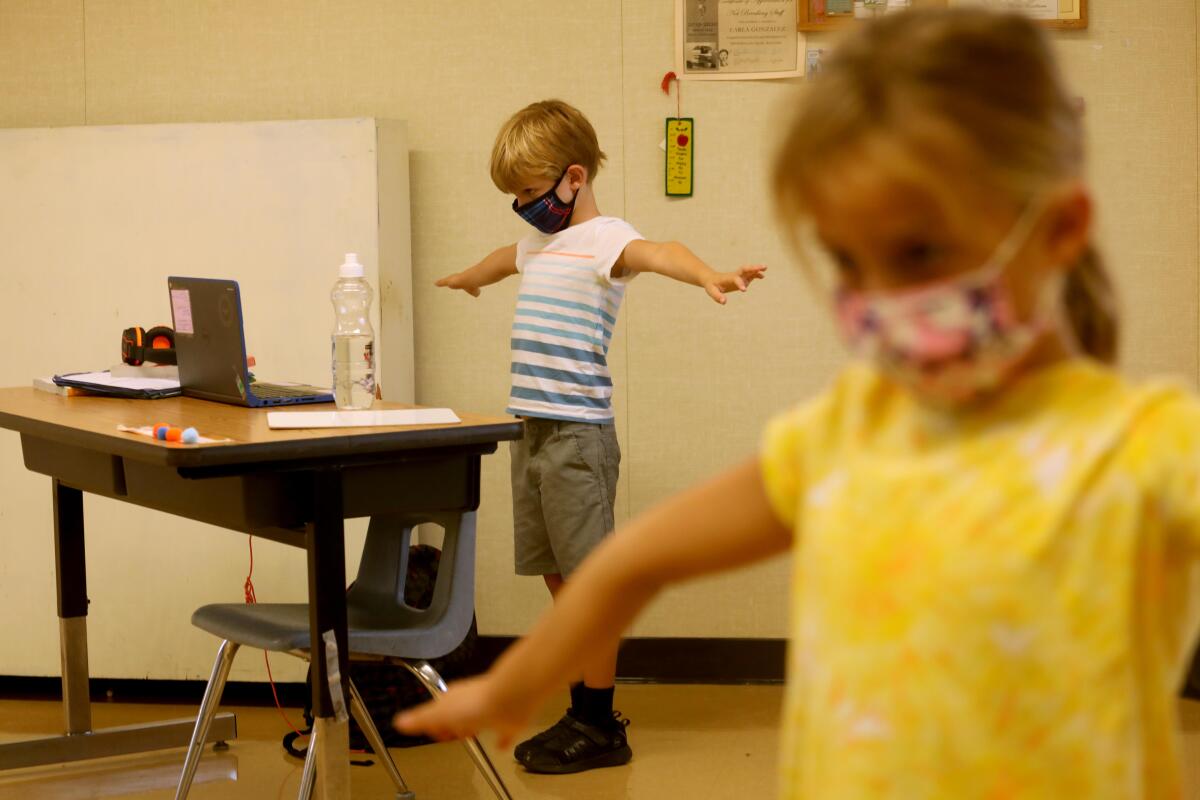
Yet many schools have reopened anyway, either by outsourcing their facilities to established providers like the Y or by rebranding as day camps, which are license-exempt and virtually unregulated in California.
“There have been site visits to some of these schools to ensure that they are implementing the [county’s coronavirus] protocol with proper fidelity and are in compliance,” L.A. County Public Health Department spokeswoman Natalie Jimenez wrote in an email. “Beyond assuring compliance with our orders, Public Health does not have enforcement authority over whether a private school chooses to operate as a camp.”
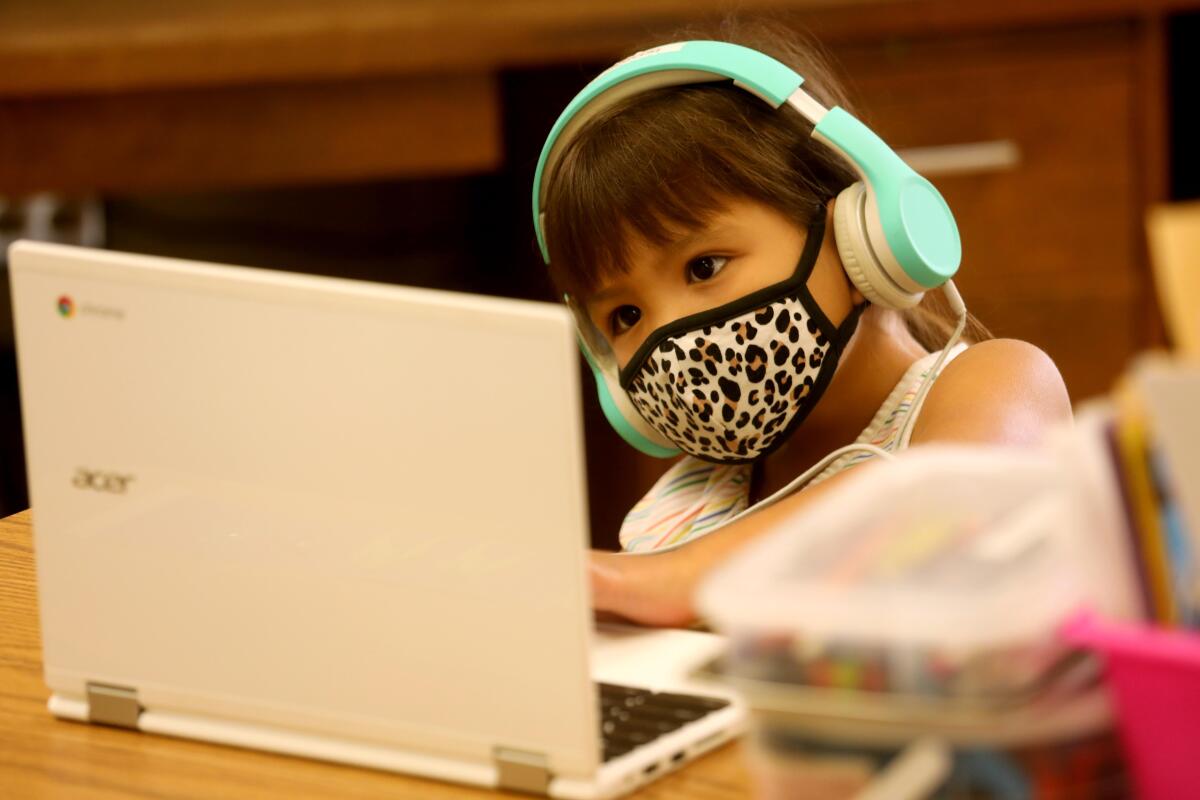
Neither does the state Department of Social Services, which licenses most other forms of childcare. On Sept. 4, DSS issued new guidance for license-exempt childcare, including day camps, requiring providers to notify their local health department and submit to inspections if they intend to open a program, and in some cases to request a waiver from the state. But so long as they follow sanitation and social distancing protocols, almost nothing precludes students from learning in classrooms the county has deemed unsafe for school — nothing but the price, which can range from $200 a week to several thousand a month.
“This is a major equity issue,” said Tyrone Howard, a professor of education at UCLA. “I’m not begrudging caregivers who provide this to their children — I begrudge a system that allows this to happen, knows it’s happening, and doesn’t acknowledge it.”
San Diego County has gotten the green light to reopen schools, and Orange County officials believe they’ll soon be allowed to follow. But the picture on a school district level is far more complicated.
Some providers, like the YMCA, subsidize low-income students in fee-based programs, while some districts such as Glendale Unified have taken on the cost of care for their neediest students. But the majority of children in classrooms in L.A. right now are there because their parents can afford it and are desperate for care.
“What this shows is that schools fill a big void for families,” said Chris Jefferson, the metropolitan Los Angeles Y’s assistant vice president of childcare. “We want to fill as much of that as we possibly can.”
Yet programs in public schools are small compared to the vast private market, where some worry the county’s strict position on waivers may have backfired, emboldening private schools to seek workarounds, and pushing desperate parents to accept them.
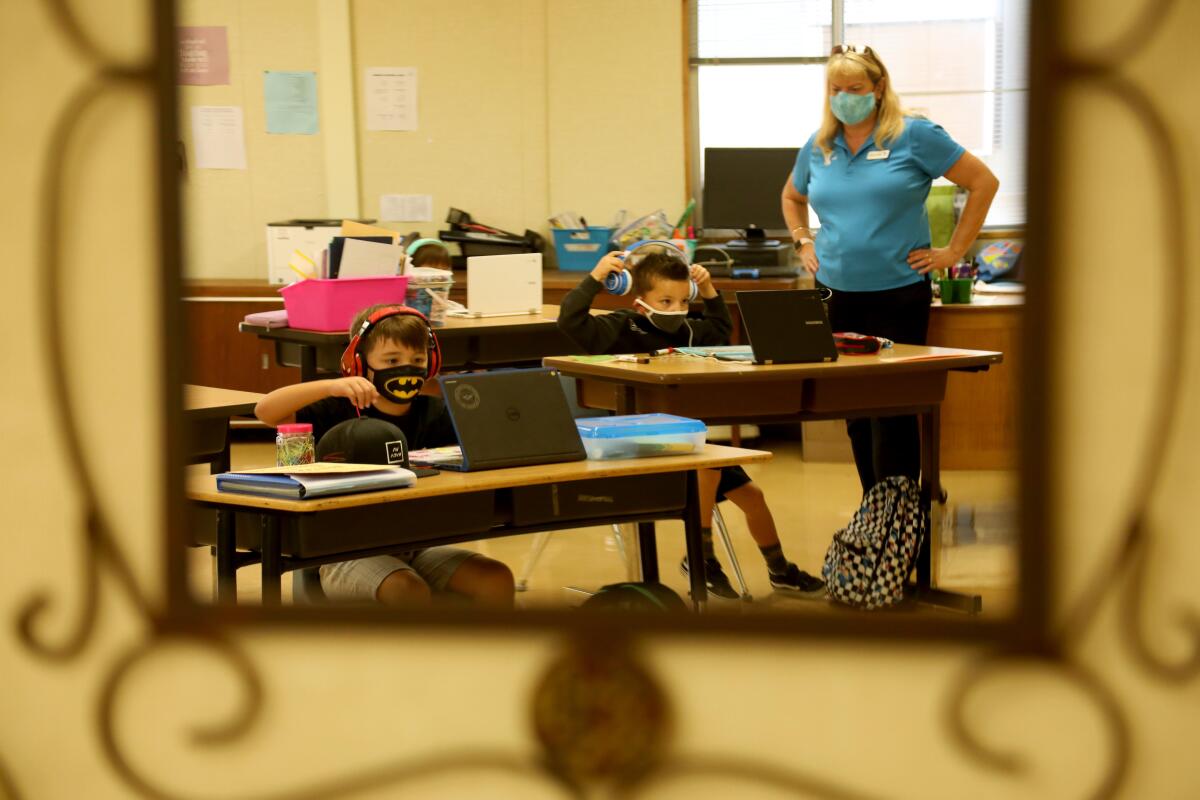
“The plan was to apply for a waiver, but Los Angeles County said they’re not giving anybody waivers, so my school looked for loopholes,” said an elementary school teacher at Emek Hebrew Academy, a Jewish day school in Sherman Oaks, who asked not to be named for fear of losing her job. “Instead, they opened this camp.”
Indeed, a market pioneered by tutoring programs like Sylvan Learning and Star Tutors is now increasingly dominated by schools, with little besides masks and partitions to distinguish newly inaugurated academic day camps from pre-pandemic classrooms. On Tuesday, campers at Sierra Canyon School in Chatsworth used balloons to experiment with static electricity, while those at Harkam Hillel Hebrew Academy in Beverly Hills watched Israel and two Arab nations sign the Abraham Accords over livestream. On Wednesday, campers at Woodcrest School in Tarzana studied the Indigenous people of the Southwestern U.S. at desks enclosed by clear plastic barriers.
Children in such programs still spend part of each day learning remotely, as required by law. But most of their time is spent on “enrichment” — outdoor science experiments, distanced games, and religious studies at some private schools. Although most staffers who care for them are educators, they don’t teach academic subjects — at least, not while they’re in the same room.
“I feel like I’m skating in this really weird margin,” said Jill Miller, whose daughter left a popular Studio City public school to attend Woodcrest this year. “There’s a part of me that feels like we’re getting away with something.”
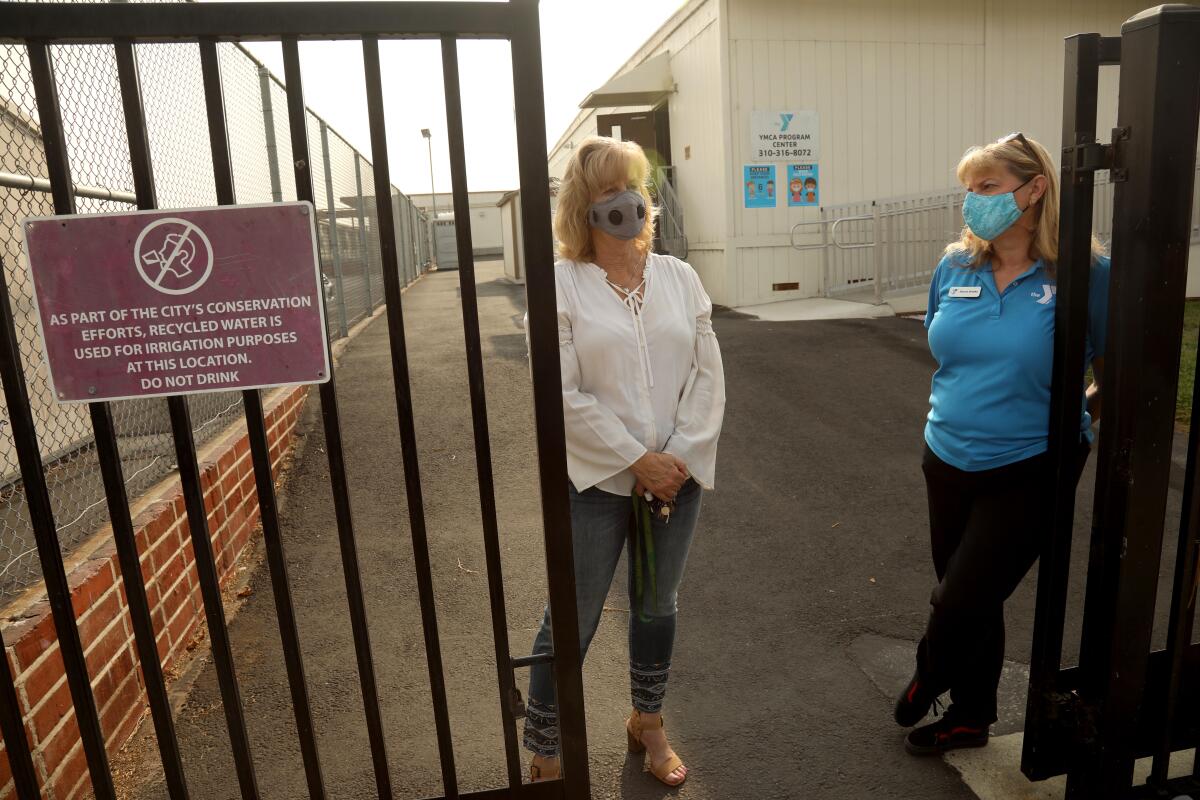
Still, camps for elementary school students, while unlicensed, largely conform to what would be allowed under state waivers, which many California counties have already issued. More concerning to some parents and teachers are camps that have opened for junior high and high school students — groups explicitly excluded from the state’s waiver program.
“Our students are hurting,” Executive Director Lev Stark wrote in an Aug. 26 note to families at private Valley Torah High School, which reopened as Teen Jewish Studies Day Camp. “The Day Camp scenario became the best solution for our community-wide dilemma.”
According to the letter, teen campers study religious subjects in person for half the day, and spend the other half learning academic subjects over Zoom.
The County Department of Public Health, citing high local COVID-19 rates, said it will not grant elementary school reopening waivers until cases drop.
Students at Ambassador High School, a private Christian school in Torrance, have also begun gathering weekly in students’ backyards to watch chapel services together.
“At the beginning of the year, our students were reporting a lot of depression and anxiety,” said Michael Barker, head of school. “Just being together in the backyard, six feet apart and supporting each other, has helped a lot.”
Jefferson, the YMCA executive, said that high school students suffer the effects of social isolation differently than younger ones and may also need help with their schoolwork, even if they’re old enough to sit still. But there is a growing scientific consensus that children over 10 are far more likely to catch and pass the novel coronavirus than younger children are, making group settings more dangerous for them.
“There’s no question I would put myself between a shooter and my children,” the Emek teacher said. “But right now I’m in a position where they’re asking me to sacrifice myself — for what?”
It’s hard to predict what may happen when California’s primary schools reopen. But when it comes to the state’s youngest students, data are more robust and reassuring.
Even if the camps are safe, the fact that they operate as an open secret — widely known but rarely acknowledged in public, even by officials who have created new rules to monitor them — has inflamed already frustrated parents. And the failure to name what is happening could itself deepen inequities, experts warn.
“If we acknowledge it’s an unfair system, that’s a start,” said Howard, the UCLA professor. “Someone needs to come out and say, there are kids who are not losing much of a step academically ... and when we come back, we are going to have to pay a price to those children we failed.”
More to Read
Sign up for Essential California
The most important California stories and recommendations in your inbox every morning.
You may occasionally receive promotional content from the Los Angeles Times.
